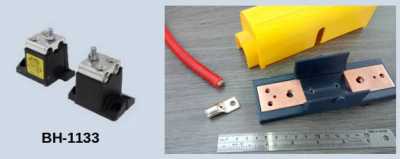@chickenbig my cells should be balanced. But I'll check them before I do anything when connecting. As to torque, I'll probably just buy a digital torque wrench
Posted by: @chickenbigthese are 400A Zeeman ANMH fuses; they have an interrupt rating of 2,000A@80V DC. Has anyone performed testing around what interrupt capacity is actually required for LiFePO4 batteries
We need to think of this from the alternative viewpoint.
If a short-circuit were to occur, a 16S (48v) LiFePO4 battery would supply about 20kA. It is unlikely to experience serious damage from doing so, because that's the consequence of its chemistry. The cells survive.
However, the downstream device which caused the short-circuit will not emerge unscathed. If it's the charger/inverter, then the energy conversion to heat could easily cause a fire. 3.6MJ in 1mS is available if the electronics tries to 'take it'.
A Type-T fuse is preferable because it's designed to operate very fast at such currents. The charger/inverter will still be damaged, but the house doesn't burn down.
If I was an Insurer, or a Loss Adjuster working on their behalf, that's the level of protection I'd expect to see.
The UK doesn't (yet) have any regulatory controls or guidance for connection of off-grid ELV battery storage. If it did, then I suspect that house insurers would refer to that document in order to assess their level of risk.
In the meantime, it's down to Forums like this to promote common-sense safe practice, based on experience and the laws of physics. I've done basic research into Type-T fuses, which is why I made that recommendation, whereas I have little knowledge of the Zeeman ANMH fuses as yet.
Equally, I reserve the right to change my mind as we share information and find our way forward together! 😎
Save energy... recycle electrons!
Out of curiosity why not use a cheaper manual torque wrench with a calibration certificate and meeting the ISO standard +-3% accuracy?
Is it that you trust your digital wrench more? Do you often get it recalibrated?
I am no expert, just curious.
Again out of curiosity. Did you inform your building and contents insurance company you were installing solar panels and batteries in your home? Did they have any questions or requirements? Is there any mention of solar panels or storage batteries in your policies?
Does having solar panels and batteries increase the cost of insurance due to their value?
Posted by: @jeffwhy not use a cheaper manual torque wrench with a calibration certificate
Is that question for me @jeff ?
When researching the range of torques I was likely to require for installing LiFePO4 batteries it was clear that I needed one that would operate below the usual ranges. Wera is well known to me as a high quality manufacturer of screwdrivers, and I found a supplier of their A6 torque wrench which was then at a substantial discount.
When fitting busbars to EVE cells I usually torque first to 6Nm and then re-visit each nut to torque again at 8Nm, which is the level specified by the manufacturer.
Posted by: @jeffIs it that you trust your digital wrench more?
I don't have a digital wrench.
Posted by: @jeffDid you inform your building and contents insurance company you were installing solar panels and batteries in your home?
No. I have had off-grid PV panels for 15+ years and changed insurers several times. When they did ask questions, they were only interested in panels connected to the grid via an inverter. That may not seem logical to me because such panels will have been installed by an accredited professional, but who am I to argue?!
I've now had grid-connected PV panels and a grid-connected storage battery for about 18-months. When I switched to my current insurer, there were no questions about renewable-energy installations at the home.
Save energy... recycle electrons!
Posted by: @transparentPosted by: @jeffwhy not use a cheaper manual torque wrench with a calibration certificate
Is that question for me @jeff ?
When researching the range of torques I was likely to require for installing LiFePO4 batteries it was clear that I needed one that would operate below the usual ranges. Wera is well known to me as a high quality manufacturer of screwdrivers, and I found a supplier of their A6 torque wrench which was then at a substantial discount.
When fitting busbars to EVE cells I usually torque first to 6Nm and then re-visit each nut to torque again at 8Nm, which is the level specified by the manufacturer.
Posted by: @jeffIs it that you trust your digital wrench more?
I don't have a digital wrench.
Posted by: @jeffDid you inform your building and contents insurance company you were installing solar panels and batteries in your home?
No. I have had off-grid PV panels for 15+ years and changed insurers several times. When they did ask questions, they were only interested in panels connected to the grid via an inverter. That may not seem logical to me because such panels will have been installed by an accredited professional, but who am I to argue?!
I've now had grid-connected PV panels and a grid-connected storage battery for about 18-months. When I switched to my current insurer, there were no questions about renewable-energy installations at the home.
No the questions deliberately were not just directed at you @Transparent.
I was curious about a variety of view points and experience to be honest. Your knowledge is always very useful.
I appreciate some of my questions are not well formed as i am no expert. For example a torque and a wrench, manual and digital torque ranges etc.
Thanks for the responses, useful to know.
I am sometimes wary about asking anything in case i come across as an idiot as with the whole torque and fuse stuff as examples. So thanks for your patience.
Am curious about fuses.
Do we have examples of what installers are fitting for battery storage, not because i think they may good or bad necessarily, just out of curiosity about what sort of solution they are putting in?
Do those with batteries on this forum know what they have?
@jeff this is the Torque wrench I am considering - https://www.amazon.co.uk/ACDelco-ARM601-3-Digital-Torque-Wrench/dp/B08YK8ZH47
5-50Nm
Posted by: @bataltowhat size fuse do you think is present in the box?
In which box? ... the Mason enclosure manufactured by Seplos?
And do I assume we're discussing the 'size' in Amps, as opposed to millimeters? 🤔
I'm suggesting that the Breaking Capacity is every bit as important as the rated value. The Bussman type-T which I'm currently using is rated 250A, with a breaking capacity of 200kA.
I wouldn't expect the 250-FM fuse to 'blow' because my inverters have taken slightly more than 250A through it. I've got DC circuit-breakers for that level of current protection. The fuse is there to provide fire/explosion protection in case of a short-circuit.
At the moment I'm building my own fuse-holders with an outer cover. I can't find a supplier with stock of the Bussmann BH-1133 modular fuse-blocks.
Save energy... recycle electrons!
@transparent Yes the amp rating. ChickenBig said "I confirmed with a Seplos tech-support person that these are 400A Zeeman ANMH fuses; they have an interrupt rating of 2,000A@80V DC"
Zeeman is a Chinese manufacturer. Their website provides scant detail of their ANMH fuse range.
It isn't even clear if the 'ANMH' name refers to the fuse characteristics, or merely the case style!
Similar looking 'ANH' and 'ANS' fuses from other manufacturers are commonly used in electric vehicles.
It's a 'slow blow' fuse, and similar to the Type-T in that respect. It will tolerate surges when motors start up, for example.
I'm wary of three points:
- Zeeman quote an Interrupting Rating of 2000A. That's not the same as a Breaking Capacity, and is much lower than the instantaneous current which would flow from a 48v LiFePO4 battery if the attached inverter went short-circuit.
- The ceramic casing may well 'contain' the arc as the fuse ribbon melts, but it doesn't look physically large enough to contain any silica-based quenching agent.
- The blow-time of 0.1 to 1 second at 2kA of current seems too long. To prevent a 'flash fire' in the electronics of an inverter, I'd want to see a fuse operating much faster than that - say, within 1mS.
I'd want to know more detail before I'm confident that the Zeeman ANMH really would prevent fire from an accidental short circuit.
Remember, you don't have to stick with the internal fuse which Seplos supply in the Mason box. You can always add a second fuse in series. If it's physically too large to go inside the box, then add it externally.
The whole point is that both you and a house insurer would feel confident that you've taken reasonable steps to minimise risk. (That's what Loss Adjusters want to see.)
Save energy... recycle electrons!
- 27 Forums
- 2,495 Topics
- 57.8 K Posts
- 260 Online
- 6,220 Members
Join Us!
Worth Watching
Latest Posts
-
RE: Setback savings - fact or fiction?
@cathoderay The input power is largely determined by...
By RobS , 11 minutes ago
-

RE: Humidity, or lack thereof... is my heat pump making rooms drier?
@editor, this is now an example of greenwashing in the ...
By Majordennisbloodnok , 22 minutes ago
-

RE: Electricity price predictions
@transparent Im impressed by all your work on this. ...
By JamesPa , 2 hours ago
-

RE: Solis inverters S6-EH1P: pros and cons and battery options
Just to wrap this up here for future readers: The S...
By Batpred , 2 hours ago
-
RE: Struggling to get CoP above 3 with 6 kw Ecodan ASHP
Welcome to the forums.I assume that you're getting the ...
By Sheriff Fatman , 2 hours ago
-

RE: What determines the SOC of a battery?
I agree. Fogstar confirmed that the Seplos BMS does ...
By Batpred , 3 hours ago
-
RE: Say hello and introduce yourself
@editor @kev1964-irl This discussion might be best had ...
By GC61 , 4 hours ago
-

RE: Testing new controls/monitoring for Midea Clone ASHP
@benson — as @tasos suggests, plotting multiple variabl...
By cathodeRay , 6 hours ago
-

@painter26 — as @jamespa says, it's for filling and re-...
By cathodeRay , 8 hours ago
-

RE: Oversized 10.5kW Grant Aerona Heat Pump on Microbore Pipes and Undersized Rads
@uknick TBH if I were taking the floor up ...
By JamesPa , 18 hours ago
-

RE: Getting ready for export with a BESS
I would have not got it if it was that tight
By Batpred , 20 hours ago
-
RE: Need help maximising COP of 3.5kW Valiant Aerotherm heat pump
@judith thanks Judith. Confirmation appreciated. The ...
By DavidB , 23 hours ago
-

RE: Recommended home battery inverters + regulatory matters - help requested
That makes sense. I thought better to comment in this t...
By Batpred , 24 hours ago
-
Bosch CS5800i 7kW replacing Greenstar Junior 28i
My heat pump journey began a couple of years ago when I...
By Slartibartfast , 24 hours ago
-

RE: How to control DHW with Honeywell EvoHome on Trianco ActiveAir 5 kW ASHP
The last photo is defrost for sure (or cooling, but pre...
By JamesPa , 1 day ago
-

RE: Plug and play solar. Thoughts?
Essentially, this just needed legislation. In Germany t...
By Batpred , 1 day ago
-
RE: A Smarter Smart Controller from Homely?
@toodles Intentional opening of any warranty “can of wo...
By Papahuhu , 1 day ago
-
RE: Safety update; RCBOs supplying inverters or storage batteries
Thanks @transparent Thankyou for your advic...
By Bash , 1 day ago
-
RE: Air source heat pump roll call – what heat pump brand and model do you have?
Forum Handle: Odd_LionManufacturer: SamsungModel: Samsu...
By Odd_Lion , 1 day ago
-
RE: Configuring third party dongle for Ecodan local control
Well, it was mentioned before in the early pos...
By F1p , 2 days ago
-

RE: DIY solar upgrade - Considering adding more panels
I know this is a bit old, but it made me wonder what co...
By Batpred , 2 days ago
-

RE: New Vaillant aroTherm Plus in black - When will it come to the UK?
@majordennisbloodnok Daikin, take note! (In fact, I hav...
By Toodles , 2 days ago
-

RE: Midea ASHP – how to set weather compensation
@mk4 — good work! First, I agree, no evidence of cycl...
By cathodeRay , 2 days ago




